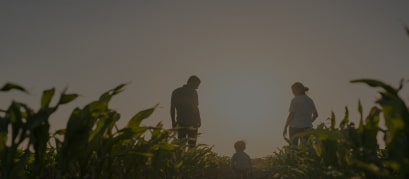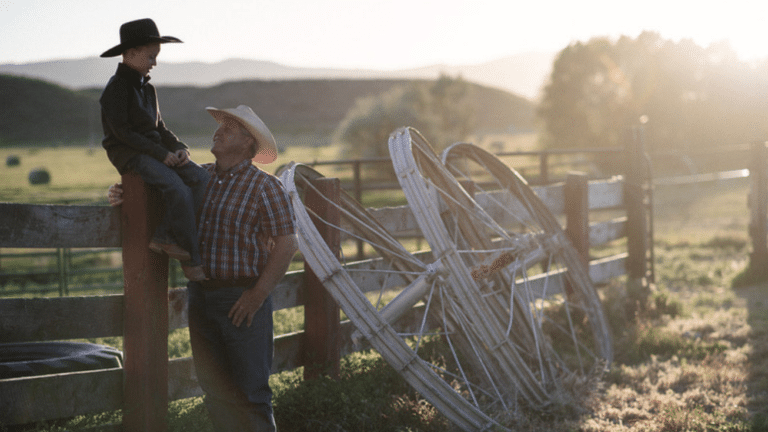The Faces of Adversity
Read the stories of five tough-as-nails farmers who are examples of the adversity farmers face and the resilience needed to prevail.
There’s no arguing that agriculture is a tough industry. The issues and adversity farmers face that can derail an agribusiness’s bottom line are numerous: drought, floods, hail, high winds, pests, disease, and market fluctuations, just to name a few. It’s enough to make anyone head for a desk job. However, the men and women of the ag industry aren’t just anyone; read five stories that highlight the mettle needed to overcome adversity.
Farmers Bruce and Sherri McKissick
The McKissick farm is in Clark County, Kansas, a small rural community just south of Dodge City. The land has been Bruce’s family for four generations. “I watched my dad and grandfather work it with a team of horses and a walking plow.” Bruce says it’s that image that keeps him going, even in the worst times. “This land is the fruit of their labor. It’s my duty to keep it viable.” The McKissick farm has grown cereal wheat for 20 years when sugarcane aphids hit in 2016 and destroyed a good portion of his crop.
The McKissicks make it through in many different ways. Bruce takes a second job when the crops aren’t great, and he participates in the government’s Conservation Reserve Program (CRP), and receives compensation for giving acreage a much-needed rest from ag production from time to time. He also terraces his fields to reduce erosion and retain moisture. “I do a lot of praying…for good weather, for healthy crops,” Bruce shares. “You can’t be a farmer and not have faith.”
Beef Cattle Ranchers Kathy and Troy Hadley
The Hadleys grow a range of crops and run 70 head of beef cattle in Polk County, Oregon. They both have farming in their genes, being 3rd and 5th generation farmers, respectively. The industry has its ups and downs, but 2016 was especially hard. Kathy’s dad, a key part of the farm team, had a massive heart attack. Hadley, who says she was “the son my dad didn’t have,” quickly picked up the slack, as did her husband, two sets of grandparents, and even her two boys, four and six.
The whole family pulled together for ground preparation and planting the year’s crops. “We managed to wrap up our planting the day before the weather turned,” Kathy shares. Her commitment to the land makes it all worth it. She says her land has been in the family for generations and “you don’t get that kind of longevity without truly sustainable practices.” Conservation efforts are high on Kathy’s list of solutions.
“There are so many factors beyond our control,” observes Kathy, “but we can control how we care for the land, whether it’s planting cover crops and strips or spreading more manure over the fields. It’s all about smart land management.”
Farm Operator Joe Marino
Joe runs the sales and marketing for his family’s 3000-acre produce company, Marino Bros.- Sun Valley Orchards, in Gloucester County, New Jersey. He knows there are no sales if there’s no produce. In 2016, Mother Nature wreaked havoc with the operation’s main crops: vegetables and peaches.
“It was our worst year ever,” says Joe. “First the colder periods in spring delayed our planting, then it got hot and dry which we love…but it made everything come up at once. We were scrambling to get it all picked, then scrambling in that five-day ‘sell or perish’ window to get it moved and sold.” However, other growers had a great growing season, meaning the supply outpaced the demand.
Joe maintains that being a big operation helps, as does diversification, but it’s a lot to handle. “Handling so many inputs in a year’s time…and waiting and wondering to see if any money rolls in when July comes…it’s always a dark cloud hanging over your head,” he shares.
While they may not be able to control the weather, Joe says Sun Valley is doing its part to be good stewards of the land. “The ag industry is so unique…you’ve got to love what you do and believe it will be OK,” says Joe, “because it is always a challenge…you’re constantly pulling a rabbit out of your hat.”
Rancher Kimmie Lewis
Kimmie Lewis took over the nearly 18,000-acre Muddy Valley Ranch from her dad in 1992, with her husband and six kids. However, tragedy struck when her husband passed away in 2000 and again when she was diagnosed with breast cancer a few years later. “With what we’ve been through, it’s tough to complain about something like drought,” says Kimmie, “but I have to say, it has been a challenging 2016. It wears on your psyche. We drill wells and are thankful for any moisture when we get it.”
But an even bigger battle facing Kimmie and neighboring ranchers is the issue of private property rights. There are many forces, both governmental and preservationist, who’ve been trying to gobble up parts of the spectacular Pinion Canyon for other uses.
Kimmie knows how to persevere against the adversity farmers face; it’s the persistence that allowed her to send all six kids to college. It’s the same tenacity that made her take her concern over the situation with Pinion Canyon and do something with it. She ran for and won a state representative’s seat for the 64th district. She’ll begin her service in January 2017. “The land is the most important thing,” says Kimmie, “As ranchers and farmers, we have the privilege of owning a little piece of heaven. We not only need to take care of it, we need to make sure it isn’t taken away.”
Row-Crop Farmer Jed Hassinger
Hassinger’s farm is in Cove, Oregon, in Union County. Jed, who is also the current president of the Union County Farm Bureau, lists “coping with lower commodity prices” as the one challenge that created the most sleepless nights. But Jed says, “Farmers can get pretty creative in order to adapt and meet the challenges that arise in this business.” Like many of his peers in the Grande Ronde Valley, he battled against falling prices by diversifying crops and changing up rotations.
“We harvested six different crops this year, compared to just three a few years ago,” says Jed. “It was a lot more work, of course, and definitely more stressful risking growing new types of crops, but we got through.”
“We farmers have to be innovative, overcome a wide variety of land challenges, and keep our chins up,” Jed points out, adding with a smile, “anything less would likely result in a very short farming career.”
As the nation’s premier land lenders, AgAmerica is ready to help the country’s growers and producers in good times and bad with our low interest rates, long amortizations, and an outstanding 10-year line of credit.
Read more of our recent success stories.






